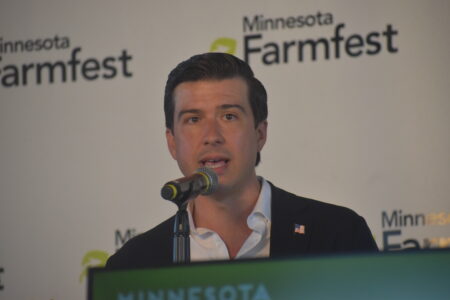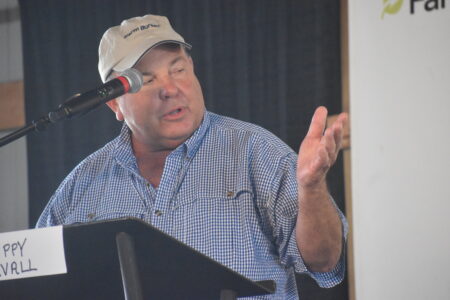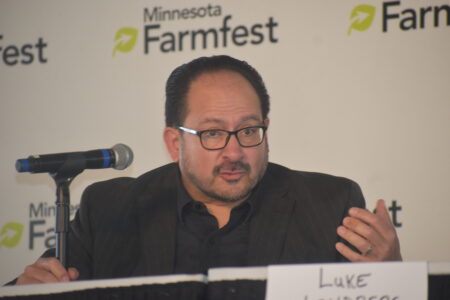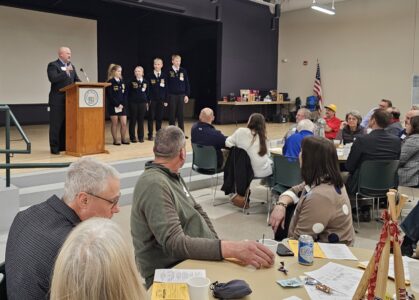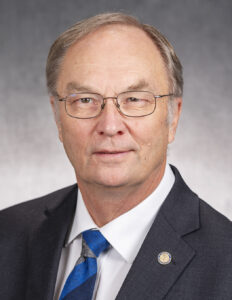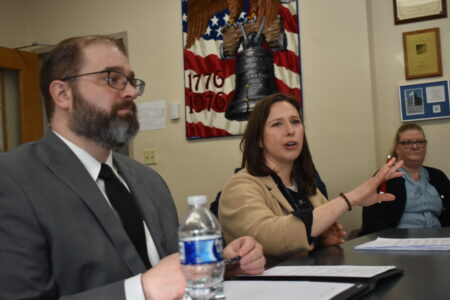‘I told him we didn’t support his tariffs’
Ag leader shares message to Trump; panel discusses trade balance, opportunities
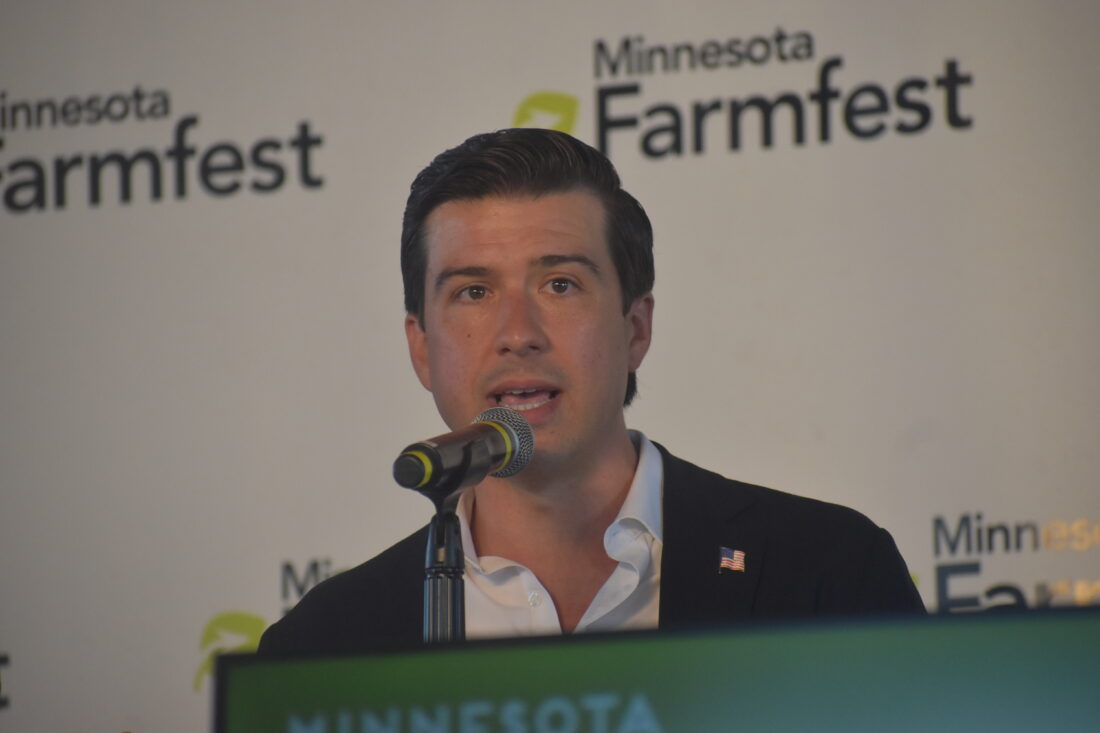
Staff photo by Fritz Busch Speaking at a Farmfest Forum Wednesday, USDA Under Secretary for Trade and Foreign Agriculture Luke Lindberg said new trade agreements makes the world like a chessboard.
- Staff photo by Fritz Busch Speaking at a Farmfest Forum Wednesday, USDA Under Secretary for Trade and Foreign Agriculture Luke Lindberg said new trade agreements makes the world like a chessboard.
- Staff photo by Fritz Busch American Farm Bureau President Vincent “Zippy” Duvall talks at a Farmfest Forum Wednesday.
- Staff photo by Fritz Busch Mexico Deputy Consul Jorge Cicero Fernandez of St. Paul discusses trade balance and opportunities at a Farmfest Forum Wednesday. He said international trade is important for regional food security.
American Farm Bureau President “Zippy” Duvall said he recently talked to President Donald Trump about it.
“I told him we didn’t support his tariffs because they hurt us, but that we sure hope his direction is successful,” said Duvall. “He said he understood how we felt about it, but I’ll assure what I am doing will bring people to the table from all over the world. I’m cautiously optimistic he’ll be successful. If we can share with the people making policy to bring them to an understanding of why, how and the way we do it, we’ve created what we need for the future of this industry.”
USDA Under Secretary for Trade and Foreign Agriculture Affairs Luke Lindberg said this is the golden age of agriculture from a trade perspective to open new markets for farmers and ranchers.
“The world is a chessboard with buyers and sellers in the same room. With new trade agreements, the actual excitement and victory is when a new deal gets done,” he said. “The Japan trade agreement is a $4.5 billion opportunity for new ag sales. The EU (European Union) deal with energy and agriculture is a $750 billion opportunity. Right now, we have a $50 billion trade deficit which concerns me. We’ve always fed the world and exported more than we’ve imported. With these new trade agreements and opportunities that never existed before, the world is becoming a new chessboard.”
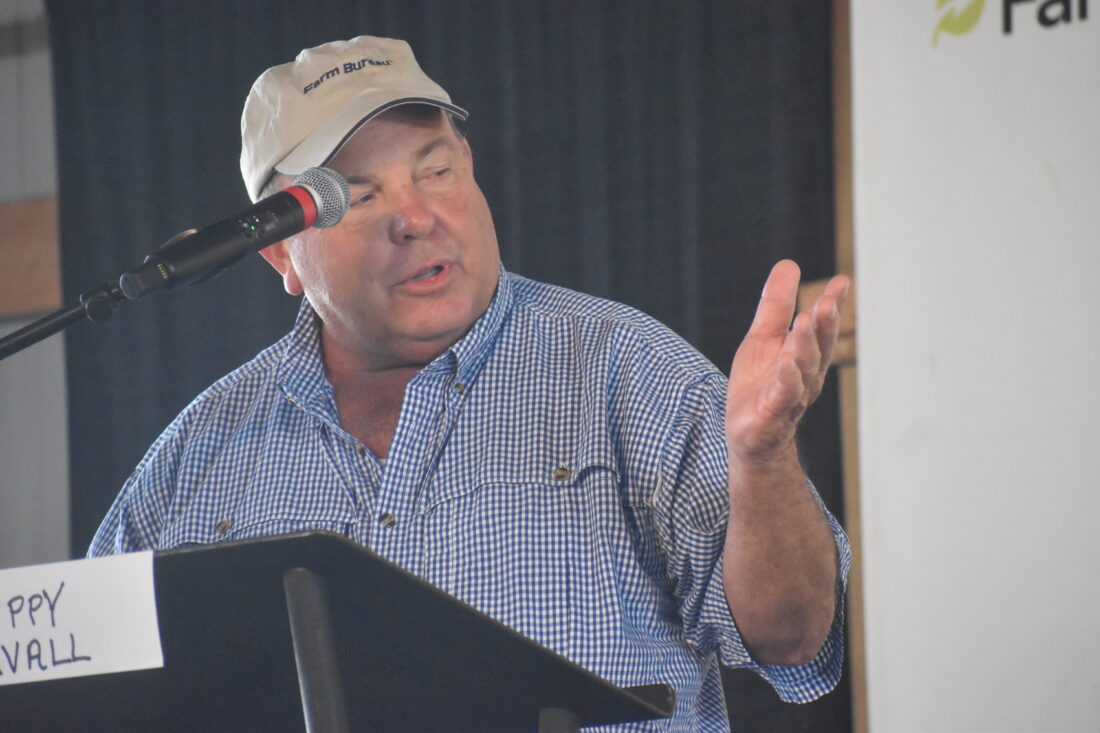
Staff photo by Fritz Busch American Farm Bureau President Vincent "Zippy" Duvall talks at a Farmfest Forum Wednesday.
Mexican Deputy Consul Jorge Cicero Fernandez of St. Paul said 2023 U.S.-Mexico trade totaled $1.6 trillion.
“I believe we’re part of regional food security that we need to keep growing,” he said.
Former National Pork Producers Council President Randy Spronk of Edgerton said he just returned from Guatemala City as part of a USDA Export Federation international trip showcasing U.S. pork, beef and lamb products, showing them to Central America and South America.
“We actually have a level playing field for meat exports that is very valuable to us without tariffs and trade barriers for U.S. beef and pork chop products for the past 10 years,” he said.
Former U.S. Grains Council President Chad Willis of Willmar said ag checkoff program initiatives promote and support specific agricultural products by collecting funds from producers to finance marketing, research, and education efforts.
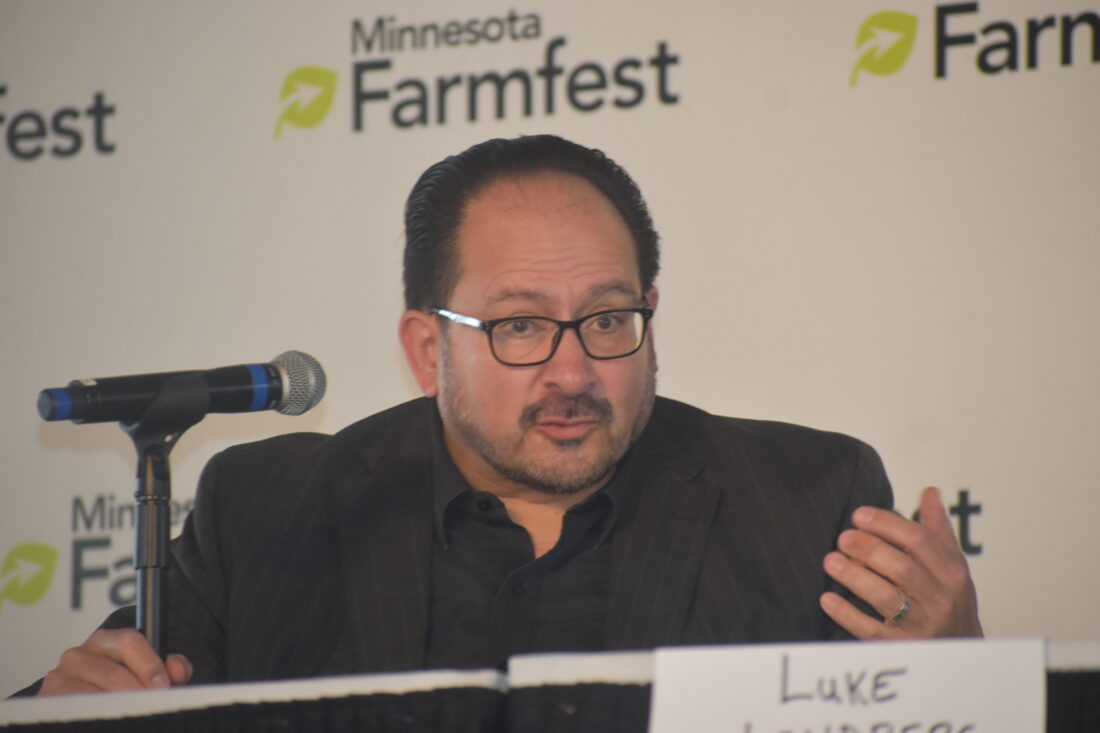
Staff photo by Fritz Busch Mexico Deputy Consul Jorge Cicero Fernandez of St. Paul discusses trade balance and opportunities at a Farmfest Forum Wednesday. He said international trade is important for regional food security.
“Checkoff funds really helped start the ethanol market. That’s why I’m glad to see extra money in the Big, Beautiful Bill now to promote U.S. grains and soybeans. Trade is all about relationships. We need to do more with that,” he said.
Past Minnesota Soybean Growers Association President Darin Johnson of Wells talked about the Farm Bill.
“We’ve had way too much uncertainty with it the last three years,” he said. “It takes all organizations working together to get market certainty back and do a Farm Bill.”
Johnson said he’s visited soybean crushing plants in China and the Philippines.
“It’s truly about relationships to do trade deals. We’re still moving discussions forward for trade negotiation,” said Johnson.
Fernandez said there are strong government lobbyists to preserve existing markets.
“We’re working together with dairy producers to keep North American trade agreements strong. I invite a Minnesota trade mission to Mexico. Together, we are stronger. We’re happy to help with more U.S.-Mexico trade deals,” he said.
Willis said the Mexican ethanol market could be huge.
Johnson said India could be a big market.
Spronk said the U.S. pays a 50% tariff for trade in China.
“There have been many trade disruptions. We need consistency now for long-range planning which is very important. We still want to trade with China, even with tariffs,” he said.
Lindberg said many U.S. producers suffer from illegal imports like seafood.
“Three-fourths of seafood is imported to America. It doesn’t really make sense,” he said.
“By 2050, one third of the world population will live on the African continent. We need to start building trade foundations with countries there now,” said Lindberg.

